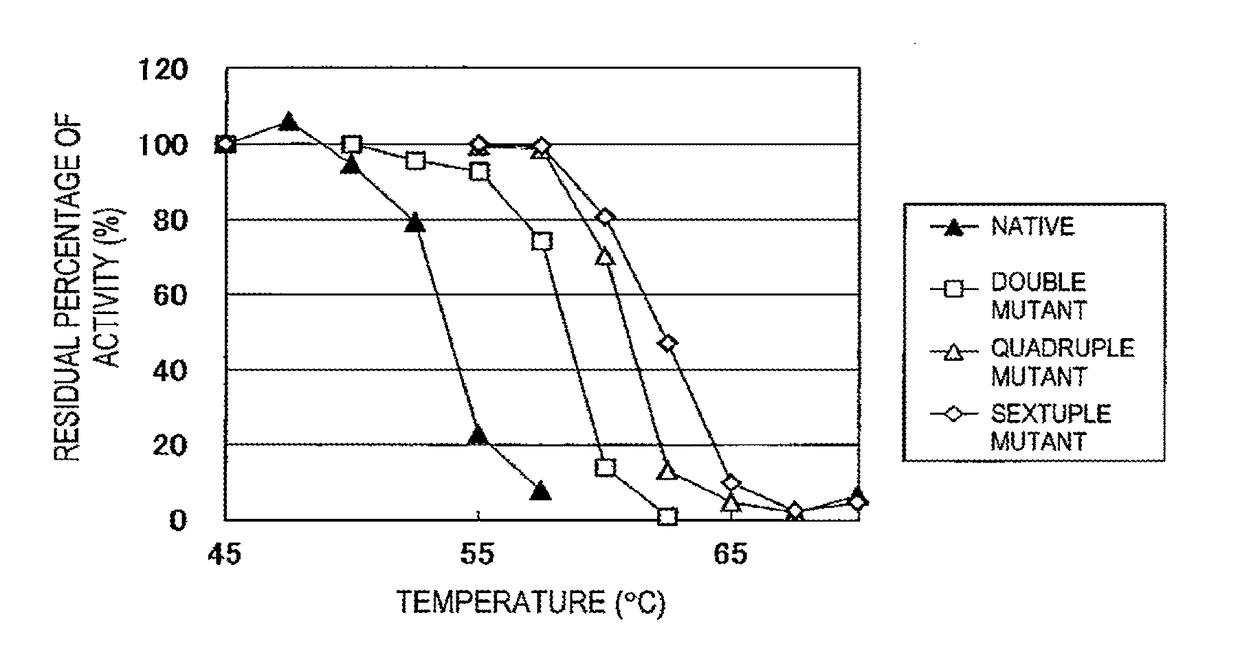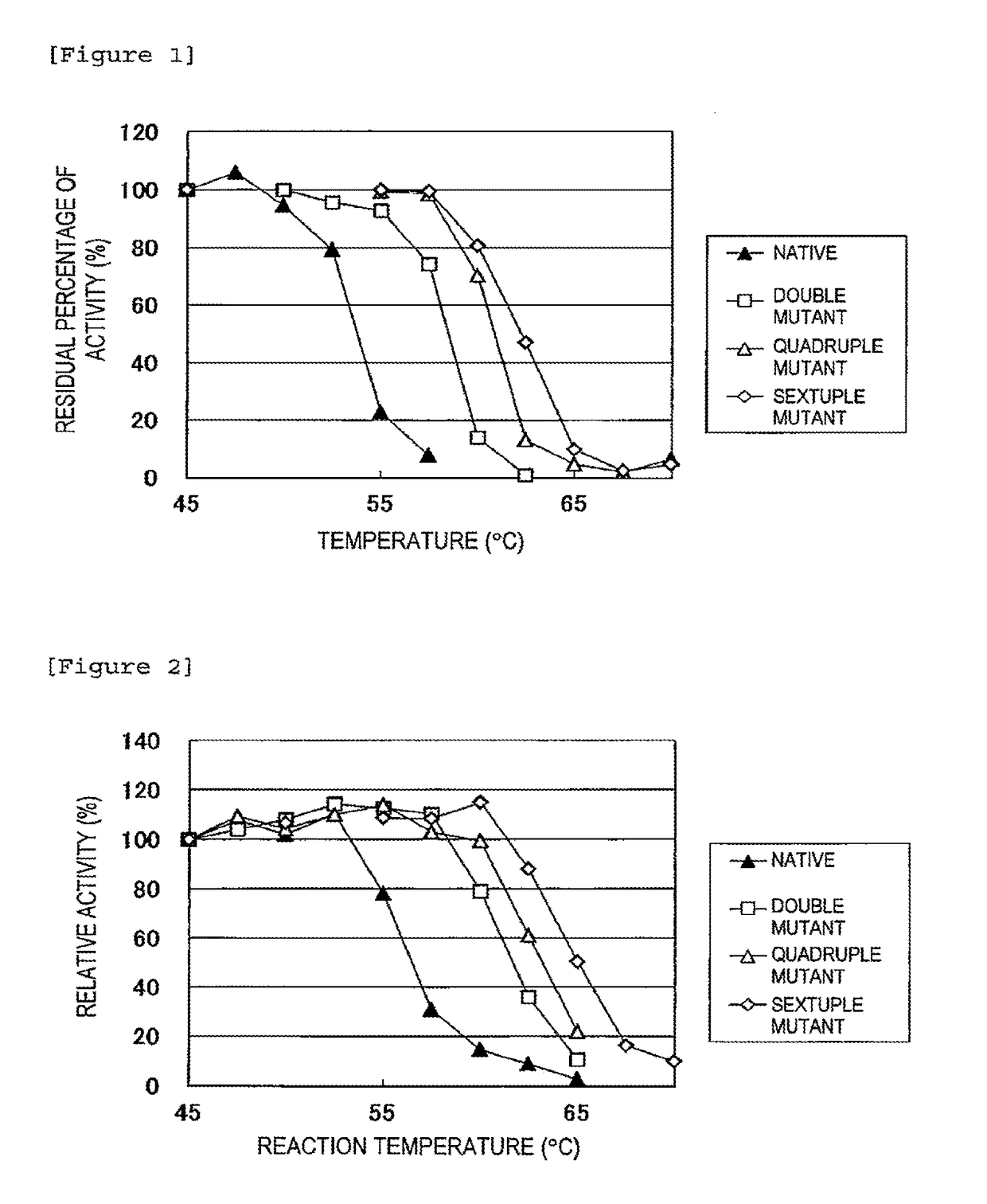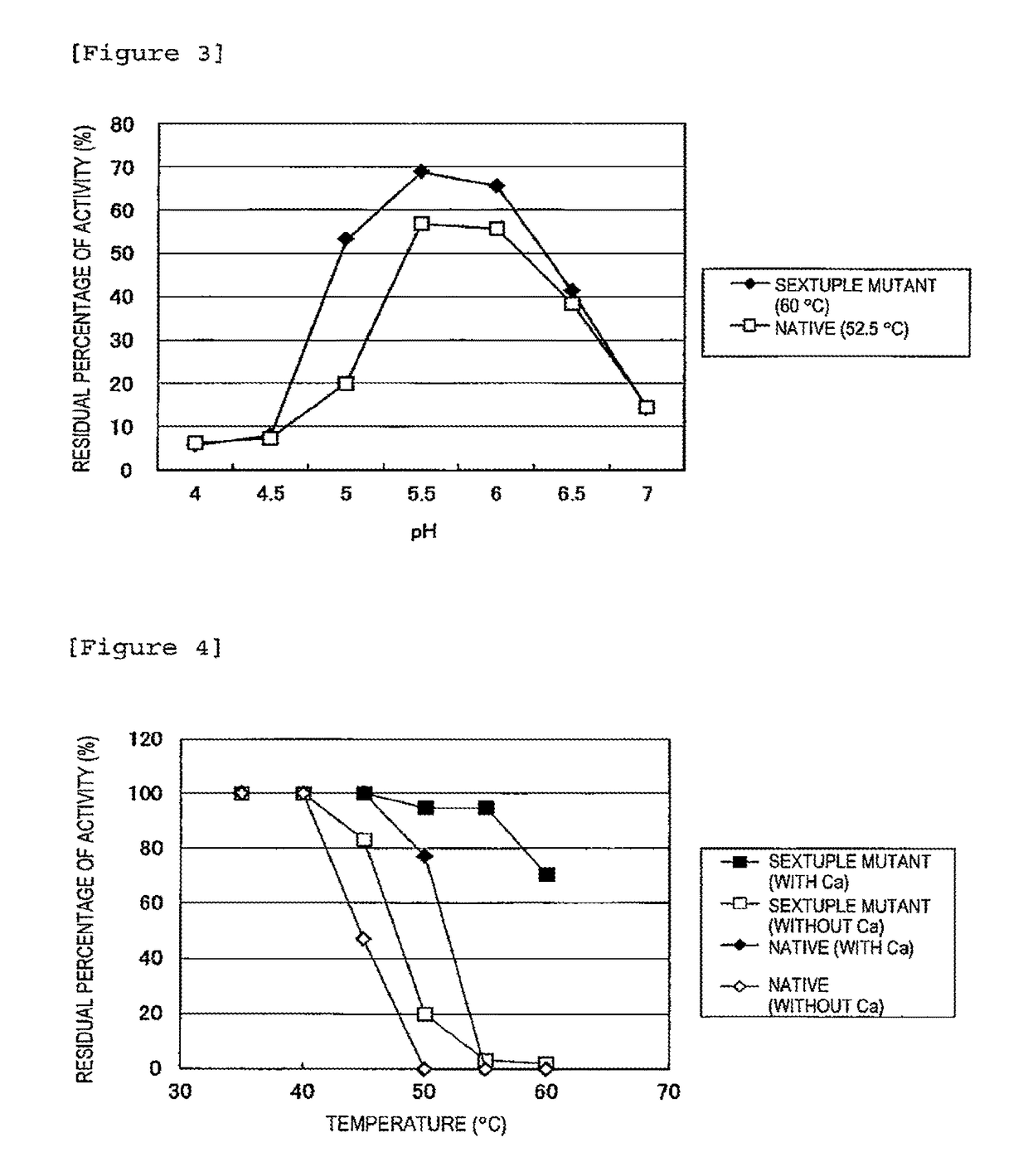Heat-resistant isoamylase
a technology of isoamylase and heat resistance, which is applied in the field ofmutant isoamylase, can solve the problems of poor acid resistance, difficult use of this enzyme, and inability to fully demonstrate the capacity of the enzyme, and achieve the effect of improving heat resistance and high purity of maltos
- Summary
- Abstract
- Description
- Claims
- Application Information
AI Technical Summary
Benefits of technology
Problems solved by technology
Method used
Image
Examples
example 1 (
Site-Directed Mutagenesis on Isoamylase)
[0046]Using pHSG398 (Takara Bio Inc.) as a template and the primers MLUPHSG398-F (CGACGCGTGGCCAGGAACCGTAAAAAG (SEQ ID NO: 2)) and XBAPHSG398-R (GCTCTAGATTTAAGGGCACCAATAACTGC (SEQ ID NO: 3)), a fragment of about 1.5 kb was obtained. The fragment was digested with the restriction enzymes Xba I and Mlu I, followed by ligation with an Xba I-Mlu I fragment of about 2.5 kb carrying the isoamylase gene on the genome of Flavobacterium odoratum to obtain p-ML. Site-directed mutagenesis was performed on the plasmid p-ML, which is an expression plasmid for the native isoamylase, to obtain the expression plasmid p-W for a double mutant (V515P / M570L). Further, site-directed mutagenesis was performed on this plasmid to obtain the expression plasmid p-Q for a quadruple mutant (T241A / V515P / M570L / S601T) and the expression plasmid p-S for a sextuple mutant (S239N / T241A / V515P / G534D / M570L / S601T).
example 2 (
Production of Enzymes)
[0047]The expression plasmid p-ML for the native isoamylase, the expression plasmid p-W for the double mutant, the expression plasmid p-Q for the quadruple mutant, and the expression plasmid p-S for the sextuple mutant were used for the transformation of the E. coli strain DH5α to obtain E. coli strains producing respective isoamylases. The E. coli thus obtained was cultured in LB media containing 30 μg / ml chloramphenicol (0.5% yeast extract, 1.0% tryptone, 0.5% sodium chloride, pH 7.2) at 30° C. for three days to obtain 1 L of culture solutions. Bacterial cells were removed by centrifugation (10,000 g, 10 minutes), followed by UF concentration (AIP module, the product of Asahi Kasei Corporation) to 10,000 U / ml. The resulting solutions were sterilized using a membrane having a pore size of 0.2 μm, whereby enzyme solutions of the native isoamylase, double mutant isoamylase, quadruple mutant isoamylase, and sextuple mutant isoamylase were obtained.
example 3 (
Improved Heat Stability of Each Mutant)
[0048]The above enzyme solutions were kept at 45° C., 47.5° C., 50° C., 52.5° C., 55° C., 57.5° C., 60° C., 62.5° C., 65° C., 67.5° C., and 70° C. for 10 minutes, followed by rapid cooling. Then, the residual activity was measured.
[0049]The method for measuring the isoamylase activity is as follows.
[0050]Acetic acid buffer (0.5 M, pH 6.0, 0.1 ml) is mixed with 0.35 ml of a 0.5% waxy corn starch solution. To the resulting solution, 0.1 ml of the enzyme solution diluted at an appropriate time is added, followed by reaction at 45° C. for 15 minutes. Subsequently, the enzymatic reaction is terminated by adding 0.5 ml of an iodine solution (a 0.5 M potassium iodide solution containing 0.05 M iodine) diluted 5-fold with 0.1 N HCl, followed by the addition of 10 ml of water and thorough stirring. Then, a measurement is taken at 610 nm using a spectrophotometer. One unit of the enzymatic activity was defined as the amount of enzyme required to increase...
PUM
| Property | Measurement | Unit |
|---|---|---|
| pH | aaaaa | aaaaa |
| temperature | aaaaa | aaaaa |
| temperature | aaaaa | aaaaa |
Abstract
Description
Claims
Application Information
 Login to View More
Login to View More - R&D
- Intellectual Property
- Life Sciences
- Materials
- Tech Scout
- Unparalleled Data Quality
- Higher Quality Content
- 60% Fewer Hallucinations
Browse by: Latest US Patents, China's latest patents, Technical Efficacy Thesaurus, Application Domain, Technology Topic, Popular Technical Reports.
© 2025 PatSnap. All rights reserved.Legal|Privacy policy|Modern Slavery Act Transparency Statement|Sitemap|About US| Contact US: help@patsnap.com



